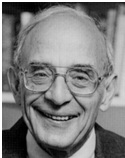|
 |
|
 |
|
|
||
Chris Argyris (1923-2013)
American professor and leading expert on organizational learning (pictured right) who died in 2013.
Key books
Organizational Learning (1978), written with Donald Schön (pictured right below) (see for more detail Organizational Learning in the Business Books section) Organizational learning (the “detection and correction of error”) is essential to business
success. Organizational learning can happen
Requirements for learning are:
a) teamwork (people interacting and co-operating in groups).
b) reflection (linked to action).
c) enquiry (continually challenging existing ideas and seeing things in new ways).
d) openness (free exchange of relevant information).
e) responsibility (people being responsible for their own behaviour)
Learning is prevented by defensive reasoning and routines which support old ways of thinking. These arise because people feel threatened or embarrassed by new knowledge.
Key quote on learning Double-loop learning occurs when error is detected and corrected in ways that involve the modification of an organization’s underlying norms, policies and objectives.
Personality and Organization
(1957)
FW Taylor’s (pictured right) scientific management (based upon autocratic management control and specialized, boring jobs):
These psychological problems can be reduced by:
1. Fulfilling work Giving people:
2. Employee-directed leadership This is based upon the satisfaction of employees’ needs.
3.The informal organization Informal contacts between employees, particularly in groups
4. Communication and trust
Key quotes on motivation If there existed no informal organization, the employee would soon find himself full of pent-up tension. Psychological success...occurs when the individual is able to direct his energy toward a goal that he defines, whose achievement will fulfil his inner needs. We cannot understand ourselves unless we understand others, and we cannot understand others unless we understand ourselves.
|
|
|
||
|
|
||
| Copyright © wisdomtowin.com 2025 All Rights Reserved | ||
|





